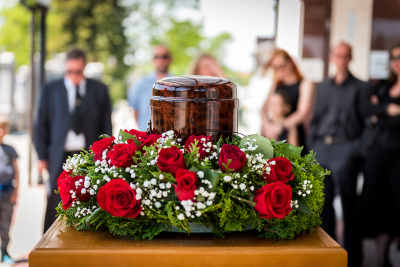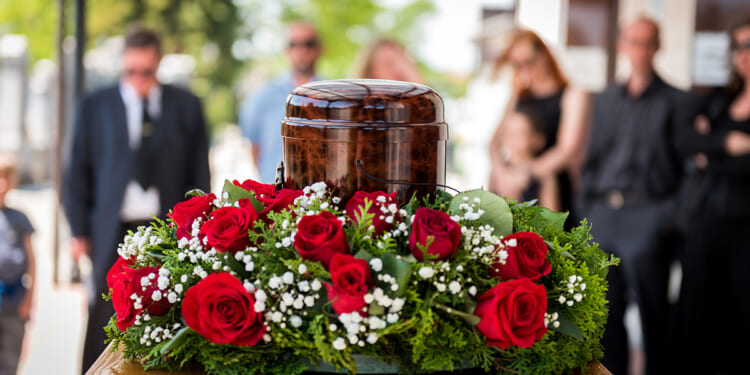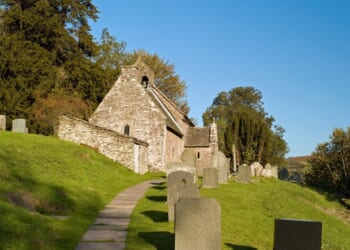
In the movie Addams Family Values, Wednesday is made fun of by other girls and is asked why she dresses in black like she’s going to a funeral. “Why are you dressed like somebody died?” a girl asks.
“Wait,” Wednesday responds.
She’s right. And the thing is, you don’t have to wait long.
Recent stats peg the number of deaths at 7.8 deaths per 1,000 people for 2025. In raw numbers: about 62 million people die each year worldwide, which breaks down to around 172,800 deaths per day globally in 2025, 120 deaths per minute, or about 2 deaths every second.
That’s a lot of souls going into eternity, some of which got up today having no idea it would be their last. Stop and think about that for just a minute, and keep in mind that it could be any one of us.
John MacArthur talks about that reality when he recounts being on the Larry King show the day after 9/11:
“Larry King said to me, ‘What is the lesson here.’ I said, ‘The lesson is everybody’s going to die, and you’re not necessarily in control of when.’ The danger of death is around us, and what contributes to that death is both around us, and even in us. Everyone dies. A hundred years from now none of us will be around; that’s inevitable. Life is the most comprehensive danger of all; no one escapes its inevitable end.”
I doubt you would select “life” as the biggest danger out of a list of other options, but I get what MacArthur is saying. In fact, it explains something Jesus said in one of His biographies that has always bugged me.
When towers fall
The part in Scripture I’m talking about is in Luke, and starts like this:
“Now on the same occasion there were some present who reported to Him about the Galileans whose blood Pilate had mixed with their sacrifices. And Jesus said to them, ‘Do you suppose that these Galileans were greater sinners than all other Galileans because they suffered this fate? I tell you, no, but unless you repent, you will all likewise perish. Or do you suppose that those 18 on whom the tower in Siloam fell and killed them were worse culprits than all the men who live in Jerusalem? I tell you, no, but unless you repent, you will all likewise perish’” (Luke 13:1–5).
Every day, skeptics throw out the problem of reconciling God and evil to Christians as their number 1 supposed issue with the Christian faith, and what do we do? We pull out our apologetics 101 course, turn to the section that covers the subject of evil, and see if it assuages their stance.
Not Jesus.
Both of the primary subgroups of evil are in the story — moral evil with the murders Pilate committed and gratuitous natural evil with the tower collapsing on unsuspecting people — and yet we don’t get an apologetics narrative or explanation from Christ about them. Instead, He tells His hearers: “Unless you repent, you will all likewise perish.”
I used to think that was a pretty cold and unsympathetic response. Think about it — if you were a relative of someone killed by Pilate or in the tower collapse, how would you have felt after hearing that?
But as usual, Jesus is zeroing in on the most critical thing in the account that those back then and we need to hear today, which is this: No one dies in a tragedy or atrocity that wasn’t going to die.
Whether you or I leave this earth in an event like one of those or peacefully in our sleep, we all still die. And then what?
The people who died in the recent hurricane in Jamaica or the 2012 Aurora theater shooting were not “greater sinners” as Jesus put it, than anyone else (notice how he deep-sixes the concept of karma?); in reality, none of us are immune from something like that. Thus, His point is you need to get right with God before you feel death’s tap on your shoulder, however it comes.
He emphasizes this again in the section that immediately follows:
“And He began telling this parable: ‘A man had a fig tree which had been planted in his vineyard; and he came looking for fruit on it and did not find any. And he said to the vineyard-keeper, Behold, that for three years I have come looking for fruit on this fig tree without finding any. Cut it down! Why does it even use up the ground?’ And he answered and said to him, ‘Let it alone, sir, for this year too, until I dig around it and put in fertilizer; and if it bears fruit next year, fine; but if not, cut it down’” (Luke 13:6–9).
You see the illustration of bearing fruit in many places in Scripture, and they all refer to the outworkings of saving faith (see James 2 for an example). No fruit, no faith, no salvation.
And no eternal protection from what the Bible calls “the second death” (Rev. 2:11).
So while we aren’t given weighty explanations for the problem of theodicy in this passage, we do have good news if we keep reading. When He delivered this teaching, Christ was headed up to Jerusalem to be delivered into the hands of Pilate, and to have his blood not mingled with other sacrifices as in the case of the murdered Gentiles, but made the sacrifice itself.
Like the pleading vineyard-keeper in the parable, Christ is our great intercessor who intervenes on our behalf where judgment is concerned. However, while God is very patient, His patience does not last forever. Notice that, in His story, Jesus asks for a reprieve for the tree not bearing fruit, not for its continued barren existence.
“If it bears fruit next year, fine; but if not, cut it down.”
During a time of a nationwide illness, theologian Warren Wiersbe once asked a friend in a neighboring town about his city’s death rate. His friend replied, “One apiece,” then added, “People are dying who never died before.”
Just like you and I will someday.
Without Jesus, life is indeed the biggest danger of all. It’s easy to forget that, especially when you’re young or things are going well, and you get settled into that it-can’t-happen-to-you mentality. But remember what Wednesday said.
Robin Schumacher is an accomplished software executive and Christian apologist who has written many articles, authored and contributed to several Christian books, appeared on nationally syndicated radio programs, and presented at apologetic events. He holds a BS in Business, Master’s in Christian apologetics and a Ph.D. in New Testament. His latest book is, A Confident Faith: Winning people to Christ with the apologetics of the Apostle Paul.

















